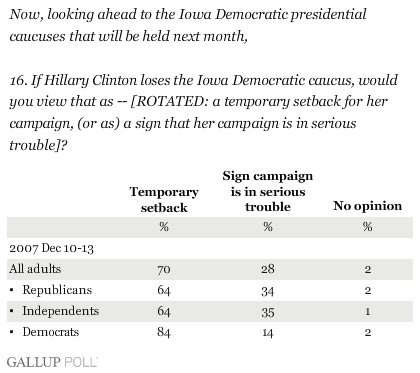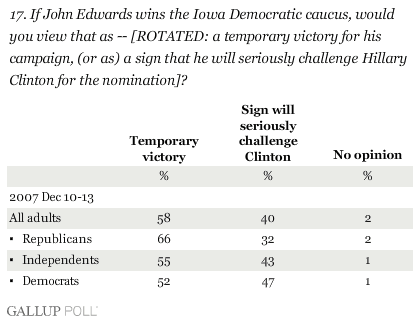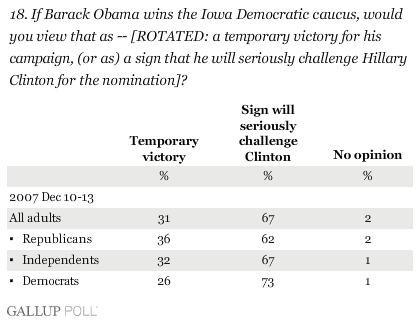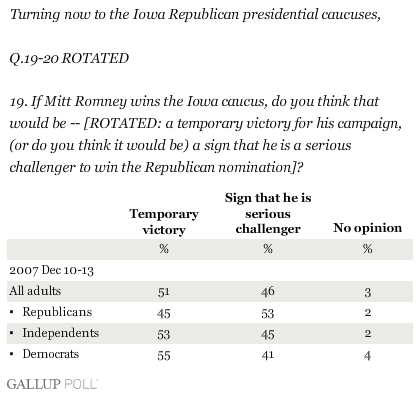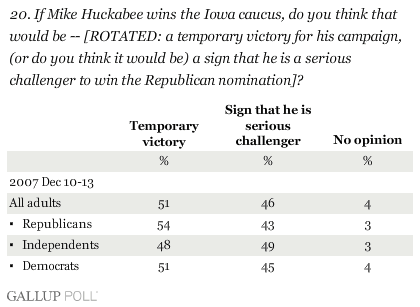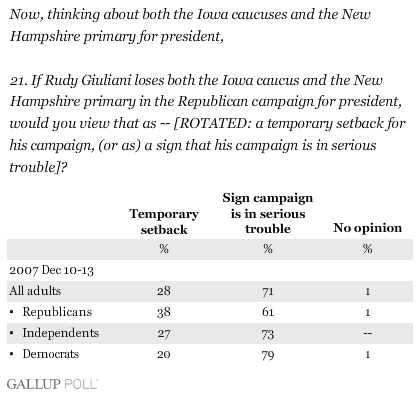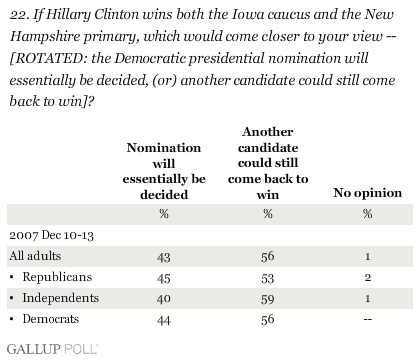PRINCETON, NJ -- The Jan. 3 Iowa caucuses are positioned to transform the dynamics, if not the outcome, of the major parties' presidential nomination races, particularly if the results defy expectations. An upset win by a candidate in this first contest of the season could sway New Hampshire primary voters on Jan. 8, and from there it's anybody's guess what happens.
Gallup recently asked Americans to adopt the role of political pundit and speculate about how various possible outcomes in Iowa and New Hampshire might affect the candidacies of the winners and losers.
According to the Dec. 10-13, 2007, Gallup Panel survey, Americans tend to play up the significance of Barack Obama possibly winning in Iowa, as well as the significance of hypothetical back-to-back defeats for Rudy Giuliani in Iowa and New Hampshire. Americans play down the significance of a John Edwards win in Iowa, and also of Hillary Clinton potentially winning in both Iowa and New Hampshire. Americans have mixed views about what winning Iowa would mean for the campaigns of Mitt Romney and Mike Huckabee.
Speculation on the Democratic Race
Most polls of likely Iowa Democratic caucus-goers show a highly competitive race among Clinton, Obama, and Edwards, making it appear that any of the three could win Iowa. That's a much different position for Clinton than is the case in the national polls, where she leads Obama by a considerable margin, and where Edwards is in a distant third place.
What effect do Americans think losing Iowa would have on Clinton's shot at the nomination? Seven in 10 Americans, including 84% of Democrats, would consider losing Iowa to be "a temporary setback" for Clinton's campaign. Fewer than one-third would see it as "a sign that her campaign is in serious trouble."
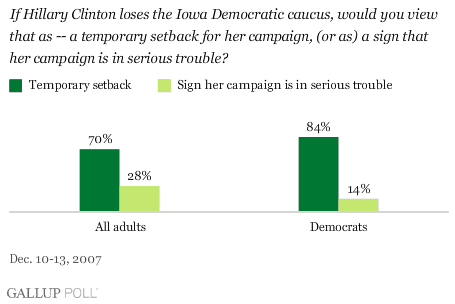
At the same time, and somewhat contrary to their views of a Clinton loss in Iowa, most Americans -- including nearly three in four Democrats -- believe an Obama win in Iowa would be "a sign that he will seriously challenge Hillary Clinton for the nomination," and not just a "temporary victory" for him.
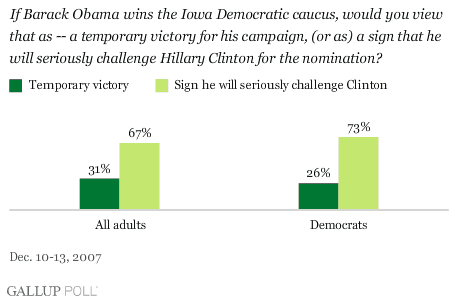
Thus, the impact of a potential Obama victory in Iowa on the psychology of the race is a bit unclear. Americans say it would make him a force to be reckoned with; at the same time, they don't seem to believe it would seriously derail the "Clinton Express."
The public is less likely to consider a potential Edwards victory in Iowa to be significant than they are to see an Obama win as significant. Four in 10 Americans (including 47% of Democrats) say Edwards winning Iowa would be a sign that he will seriously challenge Clinton for the nomination. However, the majority tends to believe this would be only a temporary victory for Edwards.
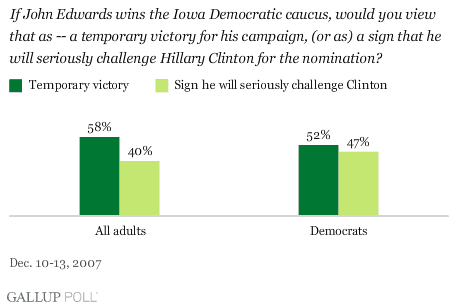
While Clinton has a lot to lose in Iowa, particularly from an Obama victory, winning in both Iowa and New Hampshire doesn't guarantee her candidacy a sense of inevitability with the public. Fifty-six percent of Americans, and the same percentage of Democrats, say that if Clinton wins both the Iowa caucuses and New Hampshire primary, another candidate could still win the Democratic nomination; only 43% to 44% say the nomination would be essentially decided.
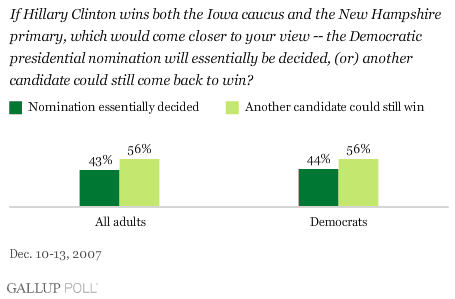
Republican-Based Prognostications
With Giuliani essentially ceding Iowa to his competitors, the race to win the Republican caucuses in Iowa is down to Romney, Huckabee, and -- to a lesser extent -- John McCain and Fred Thompson. Most polls now show Huckabee and Romney with a significant lead over the other candidates in Iowa, and recent national Republican polls show Romney and Huckabee challenging Giuliani's front-runner position. Thus, for both Huckabee and Romney, winning Iowa has major significance for their positions nationally, not just in the early primary states.
Americans are divided almost evenly over whether winning the Iowa caucuses would be a temporary victory for Romney (51%) or a sign that he is a serious challenger to win the Republican nomination (46%). Republicans tend to take a Romney win a bit more seriously, as the slight majority (53%) say winning Iowa would be a significant sign of Romney's strength as a challenger.
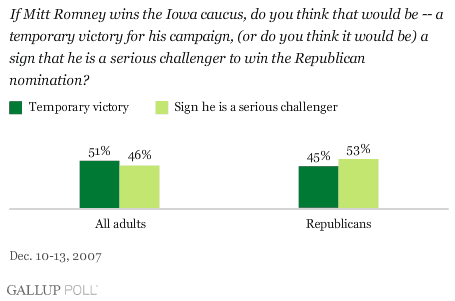
Americans on the whole are also closely divided over the meaning of a Huckabee win in Iowa: 51% say it would be a temporary victory for him while 46% say it would be a sign that he is a serious challenger for the GOP nomination. Republicans are no more likely than the public as a whole to believe that a Huckabee win in Iowa would be significant.
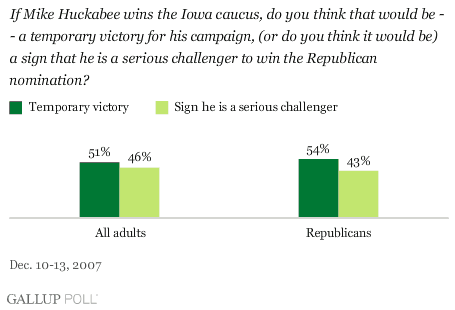
Thus, the possible impact of either a Huckabee or a Romney victory in Iowa is mixed. Republicans -- the constituency that counts in the short term -- are slightly more likely to consider a potential Romney victory in the Hawkeye state as significant than would be the case for a Huckabee victory, but views are split in both situations.
Giuliani has explained that he is running minimal campaigns in Iowa and New Hampshire in an effort to focus on the voting that will take place on Feb. 5, when 22 states, including delegate-rich California and New York, will hold their contests. However, given Giuliani's recent decline in the national polls, this would appear to be a risky strategy, and one voters won't buy into should he lose Iowa and New Hampshire, as is expected.
Only 28% of Americans believe that losing both contests would be a temporary setback for Giuliani; 71% say it would be a sign his campaign is in serious trouble. Republicans are not much more forgiving: 38% say that it would be a temporary setback while 61% say it would be a sign of serious trouble.
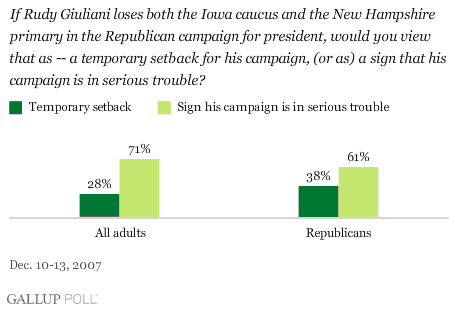
Bottom Line
The real fallout from the Iowa caucuses will depend on the precise results, media coverage and spin, and the way the candidates handle their lot in the days following the vote.
Still, the attitudes reported here offer some clues as to how Americans might react. On the Democratic side, the potential impact of a Clinton loss in Iowa appears to be mixed: Democrats say losing Iowa would be only a temporary setback for her campaign. At the same time, Democrats say an Obama win would be a sign that he was seriously challenging Clinton's front-runner position.
On the Republican side, the data suggest that the situation for Giuliani is more grave than his campaign would like to acknowledge. As much as he is trying to manage expectations around the early contests, a majority of Republicans say that back-to-back losses for Giuliani in Iowa and New Hampshire spell serious trouble for his campaign.
Survey Methods
Results for this panel study are based on telephone interviews with 1,008 national adults, aged 18 and older, conducted Dec. 10-13, 2007. Respondents were randomly drawn from Gallup's nationally representative household panel, which was originally recruited through random selection methods. The final sample is weighted so it is representative of U.S. adults nationwide.
For results based on the total sample of national adults, one can say with 95% confidence that the maximum margin of sampling error is ±4 percentage points.
For results based on the sample of 344 Republicans, the maximum margin of sampling error is ±7 percentage points.
For results based on the sample of 331 Democrats, the maximum margin of sampling error is ±7 percentage points.
In addition to sampling error, question wording and practical difficulties in conducting surveys can introduce error or bias into the findings of public opinion polls.
